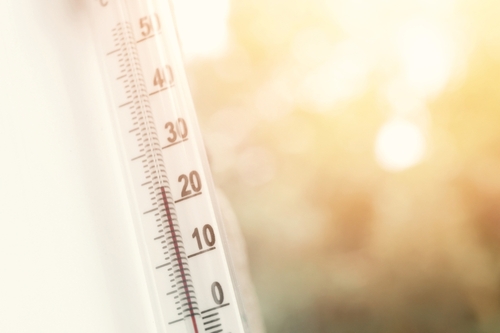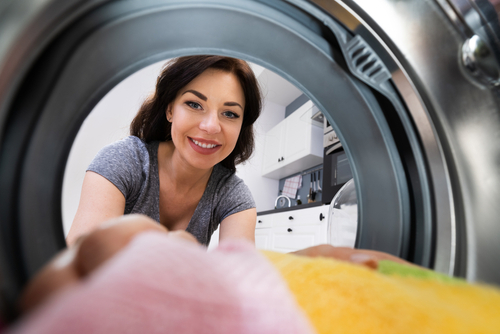 When the stock market is volatile, the best piece of advice is to diversify. By spreading your investments across different areas, you can better ride out the bumps. Did you know you can apply the same advice to save money on the energy you use to power your home?
When the stock market is volatile, the best piece of advice is to diversify. By spreading your investments across different areas, you can better ride out the bumps. Did you know you can apply the same advice to save money on the energy you use to power your home?
Reevaluating the kind of energy you use—and diversifying rather than going all-electric—is a smart way to manage energy costs. Electricity is necessary to run a lot of things—lights, phones, some appliances. But it’s not the smartest choice for all your appliances and systems. Propane is a versatile and efficient choice, and the benefits to your home, comfort—and, yes, your bottom line—might surprise you.
Most people hear “propane” and think grills. But there’s a wide range of efficient propane appliances you can use in your home. And propane appliances waste very little fuel in the combustion process, which means a smaller carbon footprint than oil or electricity and great value.
If you’re looking to improve efficiency—and add value to your home at the same time, propane appliances are an efficient and savvy choice. Here’s why:
Heating & Space Heating: Propane generates more Btus than an equivalent amount of electricity, so you need much less propane to produce the same amount of heat or energy. That means propane heats your home quickly, and efficiently, compared to electric heat, which takes much longer to reach a comfortable temperature and can struggle to maintain it—driving up your energy usage.
Water Heaters: Water heating is a big percentage of home energy bills—especially when you consider how much hot water a household uses: bathing, laundry, dishwashing. An energy-efficient propane water heater can help you reduce your energy costs, and perform better too. Tankless water heaters save energy by instantly heating water when you need it, rather than keeping a large tank hot all the time. As a result, you can enjoy virtually unlimited hot water—while seeing savings of up to 40%!
Cooking and Grilling: Nothing beats the precision and control you get cooking with gas. That’s why it’s the first choice of professional chefs in the kitchen—and on the patio. Recent stories about gas stoves and indoor air quality are a bit misleading: While natural gas stoves can potentially emit methane, a potent greenhouse gas, propane contains no methane. And, cooking of any kind creates particulate matter and affects indoor air quality, no matter what fuel is used.
Outdoor Living: Adding safe and efficient propane patio heaters can let you enjoy your outdoor spaces earlier in the spring and later into the autumn. Fire pits and fire bowls become an attractive focal point and gathering space for entertaining friends and family. And propane-fueled pool and spa heaters will warm up the water much faster than an electric heater, and maintain the temperature better once the water is warm. As a result, propane pool heaters help you keep heating costs under control, while letting you enjoy your pool or spa more.
Indoor fireplaces: A propane fireplace brings all the ambiance and warmth of a wood-burning fireplace to any room, without the mess, smoke and ash. And unlike a traditional fireplace, you can install a propane-fueled fireplace just about anywhere: living room, dining room, bedroom, even the kitchen. Imagine the luxe, spa-like glamour of a fireplace in your master bath!
Generators: When storms knock out power, a propane-fueled backup generator will keep your lights on, your refrigerator running and everything else powered up until the utility companies can make repairs.
Sure, conserving energy by turning off lights, lowering the heat or raising the AC, and using less hot water is one way to control energy costs. But if you’re refurbishing your existing home, shopping for a new place, building your dream house, or just looking for ways to reduce your fuel bills, propane provides great value. Our team of experts have the experience and knowledge to answer all your questions and help make adding propane to your North Carolina or southern Virginia home easy. We’ll make sure you have the right size propane storage tank for your needs, and provide with great propane services like automatic delivery, tank monitoring, smart payment plans to help keep costs manageable and so much more.
Contact us for more information today.
 Propane leaks are rare, but they can happen. Knowing what to do if you smell gas can help ensure the situation is resolved safely and quickly.
Propane leaks are rare, but they can happen. Knowing what to do if you smell gas can help ensure the situation is resolved safely and quickly.
Since propane is naturally odorless, propane and natural gas distributors use an additive called mercaptan to give it a distinctive smell that makes it easier to detect leaking gas. Most people describe the smell as like rotten eggs, skunk or dead animal.
Mercaptan is a natural gas that is produced by decaying plants, animals and humans (fun fact—it’s one of the compounds responsible for bad breath!). One reason it’s used in propane and natural gas is that the human nose can detect it in extremely small quantities.
Make sure everyone in your home can recognize the odor and know what to do if they smell gas.
If you smell gas and suspect a leak, leave the area immediately.
Avoid all flames or sparks—including lights, appliances, phones or cell phones—which could ignite the gas and trigger an explosion.
Call us, or dial 911 from a safe area, and stay away until help arrives.
If it’s safe to do so, you should turn off the gas at the tank. You should also shut off your tank if there has been severe weather, flooding, or a natural disaster and your tank appears to have moved, or if there appears to be damage to the tank or the gas lines. It’s not hard—but it’s important to familiarize yourself with your tank so you know what to do when it’s an emergency.
Your safety is our priority: If you have any questions about this information or any other propane safety issues, visit our about propane safety page or contact us any time.
 There’s a reason professional cooks prefer cooking with gas. Actually, there are a lot of reasons, but the main benefit of cooking with gas is the high heat combined with precision control that you just can’t get with any other cooking method.
There’s a reason professional cooks prefer cooking with gas. Actually, there are a lot of reasons, but the main benefit of cooking with gas is the high heat combined with precision control that you just can’t get with any other cooking method.
It’s true whether you’re a grill cook turning out big quantities of burgers for a lunch crowd or a five-star gourmet chef. You need that control to deliver consistent quality for your guests. So why would you sacrifice that just because you’re cooking out of a truck?
Food trucks today are turning out all kinds of fantastic food, not just sandwiches and tacos. Plenty of the best restaurants got their start serving food from a truck, and they are often ground-zero for new food trends. Our commercial propane service makes it all possible.
Compared to cooking with electricity, propane heats quickly and burns cleanly, and costs on average 2.5 times less per Btu than electricity, according to the U.S. Department of Energy. It’s also extremely safe, with a very narrow range of flammability.
You also get more consistent power: with an EV food truck and electric cooking equipment operating on a battery, you’ll slowly lose power. With a propane cylinder, you’ll get 100% power until the tank is empty.
Another benefit of propane: you can park your food truck anywhere (or, anywhere it’s legal!) while with an electric-powered cooking setup, you need to be close to a plug or worry about battery drain.
When you do need to refuel, it’s easy to swap in a new propane cylinder. It takes only a few minutes. Our propane cylinder exchange program makes it easy to capitalize on all these benefits.
The team at Pico Propane will evaluate your business’s needs for commercial propane cylinders and give you a quote for a customized cylinder exchange program. With our no-charge lease program, we can set you up with a sturdy, safe storage cage for your cylinders, and we will thoroughly train your employees in the safe handling of propane cylinders. You’ll get the cylinders you need, when you need them.
Wondering how long a tank will last? Of course, it depends on a variety of factors: you may be using your propane to heat water for washing hands and pots and pans as well as cooking. But as a general guide, consider that a standard 20-pound portable propane tank should last about 18 to 20 hours. That’s the size most people use for a full-size patio grill. For your food truck, you can opt for a 30- or 40-pound cylinder that are commonly used for water heating and cooking in an RV.
There’s a reason all kinds of businesses across North Carolina and southern Virginia rely on the experts at Pico Propane for commercial propane cylinder exchange services. Let us put that experience to work for you.
Contact us today to learn about how our commercial propane services can help your food truck or catering business!
 We get it: Home improvement projects can be fun and satisfying—and can save you some money, too. But gas appliance installation is not a DIY project. While propane is extremely safe when installed correctly, even a small leak can create an explosion hazard.
We get it: Home improvement projects can be fun and satisfying—and can save you some money, too. But gas appliance installation is not a DIY project. While propane is extremely safe when installed correctly, even a small leak can create an explosion hazard.
When you need a propane appliance installation , even if you are just replacing an old piece of equipment, you need to hire a pro. And the service team at Pico Propane have the training and experience to make sure the job gets done correctly.
There are several reasons why attempting to install gas appliances on your own is not advisable—but the number one reason is safety. While propane is generally safe, it can still be very dangerous in certain situations because it is a flammable gas.
Incorrectly installed gas appliances can result in dangerous situations, such as propane leaks. That’s why it’s necessary to hire a trained professional to install gas appliances in your home.
If there is a propane leak in your home, it can build up and be ignited by sparks from light switches or appliances, using the phone, lighting candles or cigarettes.
It is important that everyone in your home knows what to do if they detect the smell of propane gas: It smells like rotten eggs. Additionally, make sure to install propane leak detectors near all propane appliances.
Another reason you should have a pro perform installation work is that it could void the manufacturers warranty.
Installing a gas appliance requires more than just plugging it in and turning it on. You may need to install or connect an exhaust pipe or flue based on your current system’s configuration.
In addition, it’s important to adjust the regulator correctly. The propane in your storage tank is under high pressure, and the regulator lowers the pressure before the gas enters your home. It’s important to adjust the regulator correctly for propane because it has different settings than natural gas. Failure to do so could lead to a hazardous gas leak. The regulator is responsible for not only regulating pressure but also for ensuring the proper combination of propane and air for efficient combustion. Any alterations done by someone with insufficient knowledge can disturb this ratio and lead to the production of dangerous levels of carbon monoxide.
A professional technician will also ensure your appliances are ventilated properly. The codes regulating ventilation can vary depending on the location and situation, and not having proper venting can lead to poor performance and the accumulation of carbon monoxide.
While the installation work should be done by a pro, you can take some steps to make sure the installation goes smoothly. If you are replacing an old appliance, make sure the new appliance will fit in the old space, and schedule disposal or recycling of the old one. If it’s a new appliance, make sure the space where it’s being installed is clear, and outlets with the correct voltage are available.
Make sure there’s a clear path for delivery team to bring the appliance to its location, and if you have pets put them in another room to keep them and installers safe and comfortable.
Typical installations take an hour or two for most appliances.
There’s a reason people trust Pico Propane with propane appliance installations and repairs. Our expert technicians will work with you to make sure work is done right. In addition to propane storage tanks, heating and water heating systems, we can help you with a variety of appliances and equipment including log sets, firepits, patio heaters and more. Contact us today!
 If you’re used to heating your home with oil, you know that very occasionally, it can get cold enough here in northern North Carolina for your heating oil to gel, which leads to problems keeping your home warm. If you have an above-ground propane tank, you might be wondering if your propane supply can freeze or gel when temperatures plummet.
If you’re used to heating your home with oil, you know that very occasionally, it can get cold enough here in northern North Carolina for your heating oil to gel, which leads to problems keeping your home warm. If you have an above-ground propane tank, you might be wondering if your propane supply can freeze or gel when temperatures plummet.
The good news is that the freezing point for propane is -44°F—which is well below our average low here in North Carolina, which rarely gets much below 25°F in January. Suffice it to say, you don’t need to worry about your propane freezing.
Nevertheless, extended extremely cold weather can still cause problems for the propane in your tank.
Like most substances, propane contracts in cold temperatures. If your propane tank is buried, you don’t need to worry: Temperatures need to get extremely cold for a very extended period to affect the propane in an underground tank.
It’s a different situation with an above-ground propane tank. When it’s extremely cold outside, the volume of propane inside your aboveground propane tank will shrink, and if it shrinks enough, it will result in a loss of pressure. When the pressure becomes too low, the propane inside your tank will not be able to reach your gas burner. That means you may not be able to run your propane appliances, including your furnace or boiler. In addition to no heat, you need to worry about pipes freezing.
There’s a reason folks in Alamance, Caswell, Orange, Person, and Rockingham Counties in North Carolina trust Pico Propane for dependable propane deliveries, as well as tank installations, maintenance and more. We’ve got the knowledge, skills and resources and can answer all your questions about the benefits of propane for your home. Contact us today to learn more.
 There’s so much to consider when building or buying a new home. Some things are subjective and personal, such as architectural style, but others are more practical—and can affect your bottom line as well as your day-to-day comfort. Choosing appliances is one of those. Of course, appearance and features are part of the decision, but so is efficiency—and that means making a choice between electric and propane appliances.
There’s so much to consider when building or buying a new home. Some things are subjective and personal, such as architectural style, but others are more practical—and can affect your bottom line as well as your day-to-day comfort. Choosing appliances is one of those. Of course, appearance and features are part of the decision, but so is efficiency—and that means making a choice between electric and propane appliances.
People are often surprised at the benefits that propane offers. In fact, propane is one of the cleanest, most versatile and efficient fuels around. Propane offers exceptional performance and efficiency in a wide range of home appliances at a much lower cost than electricity.
If you’ve never lived in a propane-fueled home before, you might be surprised to know all the benefits.
Propane generates more Btus than an equivalent amount of electricity, so you need much less propane to produce the same amount of heat or energy. Also, propane appliances are very efficient, so they waste very little fuel in the combustion process. On the other hand, generation of electricity is the second-largest creator of greenhouse gases in the United States. That’s because most of our electricity supply is generated by coal-fired power plants. (Only the transportation sector creates more greenhouse gases.)
Because propane is so efficient, it’s a smarter choice than electricity for a wide variety of appliances, in addition to heating your home. For example, propane water heaters generate much more hot water at a cheaper cost per gallon. In fact, according to the U.S. Department of Energy, homes that heat water with propane rather than electricity can see average annual savings of $174.
The same technology that makes propane ideal for water heaters makes it a smarter choice than electricity to power all kinds of appliances that use hot water or heat:
A propane fireplace brings all the ambiance and warmth of a wood-burning fireplace to any room, without the mess, smoke and ash. And unlike a traditional fireplace, you can install a propane-fueled fireplace just about anywhere: living room, dining room, bedroom, even the kitchen. Imagine the luxe, spa-like glamour of a fireplace in your master bath! Propane space heaters (vented and unvented) are a great option to make it easy to safely and cost-effectively get more use out of any chilly space or room in your home.
If you love to cook, you will really love cooking on a gas range. There’s a reason it’s the only choice for professional chefs. Just take a peek in the kitchen of your favorite restaurant. An electric range will never provide the same control as cooking with gas. Think about why you opt for a propane grill instead of charcoal: you can adjust the flame with the turn of a knob. An electric burner can’t respond as quickly, taking more time to reduce or increase the heat.
Propane is very safe, thanks to strong government regulation and high industry standards. In fact, recent stories about gas stoves and indoor air quality are a bit misleading: While natural gas stoves can potentially emit methane, a potent greenhouse gas, propane contains no methane. And, cooking of any kind creates particulate matter and affects indoor air quality, no matter what fuel is used. While it’s a highly flammable gas under certain conditions, leaks are rare and propane is a safe and clean-burning way to heat your home and water, and run many of your appliances.
When it comes to environmental impact, propane gas is one of the cleanest and efficient fuels around. It burns cleanly and produces minimal emissions. Another important factor when it comes to evaluating whether a fuel is “green”: Propane also doesn’t harm soil or groundwater.
Did you know propane is also an American energy source? About 90% of the United States’ supply of propane is domestically generated. Most of it comes from the processing of natural gas—which is considered a greenhouse gas when burned. Propane is not considered a greenhouse gas.
In a nutshell, propane appliances deliver more power for your energy dollar, all while protecting the environment. It’s a win-win for homebuyers—and builders—who care about the environment, but also want to keep costs under control.
Whether you’re ready to make the switch, or have more questions, the professionals at Pico Propane have the knowledge, experience and resources to answer all your questions about the benefits of propane for your home. And, you can count on us for reliable propane delivery and more. Contact us for more information today.
 From manufacturing, construction and warehousing to agriculture, landscaping, hospitality and a broad range of other industries, commercial propane offers great benefits in terms of savings as well as convenience for heating, cooking and fueling.
From manufacturing, construction and warehousing to agriculture, landscaping, hospitality and a broad range of other industries, commercial propane offers great benefits in terms of savings as well as convenience for heating, cooking and fueling.
But when you have a business to run, you need to keep a lot of balls in the air. Monitoring your commercial propane supply is one ball you never want drop. Without the right tools or support, it can be time-consuming. That’s why businesses that use propane across North Carolina and southern Virginia trust Pico Propane for commercial propane solutions that work for them.
You can count on Pico Propane for reliable commercial propane delivery no matter what your business needs. We will partner with you to streamline back-office operations with convenient and reliable automatic propane delivery service for your business.
Automatic delivery ensures you will never run out of fuel, which can result in delays or interruptions of service to your customers, not to mention the expense and inconvenience of pressure tests and relighting when your tank goes empty.
For portable tanks, we can set you up with a tank refill and exchange schedule based on your usage patterns, including tank storage and safety training, whether you are powering forklifts fueling cooking operations in a food truck.
We also offer automatic delivery service for multiunit residential complexes so property managers can focus on other important services instead of tank monitoring, and tenants can count of reliable propane for heat, water heating and more.
Automatic delivery is based on a proven computer algorithm that’s based on your specific usage patterns, along with factors like the weather and the season. Our business solutions team knows the right questions to ask to make sure we’ve got your back with on-time deliveries.
The key benefit of automatic delivery is that it means you don’t have to worry about monitoring your tank levels or propane supplies. And we work with you as your business grows, to make sure your delivery schedule meets your changing needs.
With more than a century serving businesses across the area, we have a real understanding of what your operation needs, better than any national conglomerate. We’re committed to providing the same superb and attentive service to our commercial accounts as to our residential clients. We’re known for our customer service and a real understanding of your needs, and our commitment to providing our commercial clients with the most dependable commercial propane service in the area.
When you’re in business, the bottom line is always top of mind. Right up there with delivering a great product or service, you need to keep your eye on efficiency, cost and value. And whether you need bulk propane for your business, or a cylinder exchange program, Pico Propane can help you make the most of propane for your business. Not only that, we have fair, transparent pricing so there are no surprises for you.
Contact us for more information today.
 Lots of customers ask us why, when we deliver propane, their bill lists a price per gallon. Isn’t propane a gas? A lot of people might be surprised to know that when we fill your tank, the propane we deliver is in a liquid form!
Lots of customers ask us why, when we deliver propane, their bill lists a price per gallon. Isn’t propane a gas? A lot of people might be surprised to know that when we fill your tank, the propane we deliver is in a liquid form!
Propane is a byproduct of natural gas. As natural gas is processed, the liquid components are recovered, producing propane gas (as well as methane, butane and ethane).
To make propane easier to store and transport, it is compressed, which converts the gas to a liquid state. As it is released into the gas lines in your home, it expands into a gas. That’s why propane is also often referred to as Liquid Petroleum Gas, or LPG.
Surprised? Curious? Here are answers to all your questions about propane, and some of the reasons why so many customers in North Carolina and Southern Virginia are using more propane in their homes.
Is propane green? Propane is one of the cleanest fuels around. It produces minimal emissions. Propane also doesn’t harm soil or groundwater – an important factor when it comes to determining whether a fuel is “green.” Additionally, propane is a domestically sourced alternative fuel that can provide steady, reliable heat for a range of appliances at an affordable price.
How efficient is propane? Propane generates more Btus than an equivalent amount of electricity, and it delivers more than twice the Btus of natural gas, so you need much less propane to produce the same amount of heat or energy. Propane appliances are also very efficient, meaning they waste very little fuel in the combustion process. (On the other hand, about two-thirds of the energy used by a power plant to generate and transmit electricity is wasted.)
Propane water heaters generate much more hot water at a cheaper cost per gallon. In fact, according to the U.S. Department of Energy, homes that heat water with propane rather than electricity can see average annual savings of $174.
What can you use propane for? The same technology that makes propane ideal for water heaters makes it a smarter choice than electricity to power all kinds of appliances that use hot water or heat, including clothes washers and dryers, dishwashers, outdoor lighting, patio heaters, pool and spa-tub heaters and outdoor grills. It’s also the first choice of professional chefs for cooking, because a gas range offers more precise control than you can get with an electric range.
Is propane reliable? Because propane is stored in a tank at your home, disruptions to the grid or natural gas lines won’t affect you. And when you work with a dependable dealer, like Pico Propane, you can enjoy automatic delivery and tank monitoring service and know that you’ll always have propane in your tank.
Propane will also power a backup generator that will automatically go on when the power goes down. That’s reliable.
How safe is propane? Propane is very safe. Propane has very low combustibility, which means when it’s combined with air, the source of ignition must be at least 940°— twice as hot as what is required to ignite gasoline. While it’s a highly flammable gas under certain conditions, leaks are rare. Propane also has a distinct rotten-egg smell to help you quickly notice leaking gas. And, propane is nontoxic, posing no threat to soil and water, so installing propane tanks (above or below ground) is not regulated by the Environmental Protection Agency.
How hard is it to convert to propane? Converting a home to propane is a straightforward, easy process that will leave you with lower energy bills and support a cleaner environment. The average conversion takes about two days, with little disruption to your life or comfort.
How can I get propane? With more than a century of experience, we have the knowledge and resources to answer all your questions about the benefits of propane for your home. And, we can get you started, with the right size propane tank for your needs, reliable propane delivery and more. Contact us for more information today.
 Whether you are refurbishing your existing home, shopping for a new place, or just looking for ways to reduce your carbon footprint, propane provides great value when it comes to powering many of the appliances around your home.
Whether you are refurbishing your existing home, shopping for a new place, or just looking for ways to reduce your carbon footprint, propane provides great value when it comes to powering many of the appliances around your home.
If you’ve never lived in a propane-fueled home before, you might be surprised to know how versatile it is and how many ways it can be used in your home. Not only can propane provide steady, reliable heat energy at an affordable price, but it also offers exceptional performance and efficiency in a wide range of home appliances at a much lower cost than electricity.
Here are a few of the pros and cons of each:
If you’re looking to enhance your home’s value and improve efficiency, updating or adding propane appliances is a savvy move. Propane offers more bang for your buck, all while protecting the environment. It’s a win-win if you care about the environment, but also want to keep costs under control.
Whether you’re ready to make the switch, or have more questions, the professionals at Pico Propane have the knowledge, experience and resources to answer all your questions about the benefits of propane for your home. And, you can count on us for reliable propane delivery and more. Contact us for more information today.
 We’re all familiar with the ongoing supply chain issues and geopolitical conflict that has led to higher prices across the board…not just for the oil and propane to fuel your home, but also at the gas pump and at the grocery store, too. While we can’t control prices at large, we’re always looking for ways to help you keep costs manageable. And we can tell you that customers who were enrolled in one of our pricing plans for propane were protected from the worst of the past winter’s price spikes.
We’re all familiar with the ongoing supply chain issues and geopolitical conflict that has led to higher prices across the board…not just for the oil and propane to fuel your home, but also at the gas pump and at the grocery store, too. While we can’t control prices at large, we’re always looking for ways to help you keep costs manageable. And we can tell you that customers who were enrolled in one of our pricing plans for propane were protected from the worst of the past winter’s price spikes.
We know every budget is different, and that’s why we offer multiple options. Read on to see how each works and discover the best option for you.
This plan is always our most popular, even when fuel costs are low. That’s because our Monthly Budget Plan is a smart way to manage winter propane—and heating oil costs—and avoid unexpected high invoices, no matter how cold it gets or how much fuel you use.
We use an average based on your past propane or heating oil use to spread your costs evenly throughout the year. This helps to cut your winter bills nearly in half and make it easier for you to budget your expenses.
The point of the plan is to keep your fuel costs level and manageable, so if we have a particularly harsh winter or prices spike further, we’ll help adjust your payments, so you don’t get hit with a large balance in the summer. Likewise, if it’s a mild winter, we can adjust and reduce your payments. The point is to help you save while avoiding big fluctuations.
At the beginning of the season, we’ll set an agreed-upon cap price per gallon for your propane fuel. Your propane cost won’t ever go above that price. But if market prices fall, so will your price!
When you opt for this plan, you can also enroll in our Automatic Delivery service, which delivers even more peace of mind. You don’t have to remember to monitor your gauges or order propane because we’ll take care of it automatically! That means you don’t have to worry about running out.
Ready to enroll? Click here to get started.
Whether you use propane, heating oil, or both, letting the pros at Pico Propane handle all your heating needs is a smart choice. No matter what happens with prices next winter, our price protection plans are designed to help you keep costs manageable. If you’d like to sign up for a plan, now is the time to enroll. Contact us to learn about all the ways we can help you save!